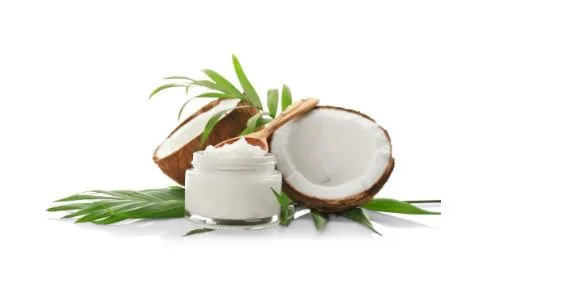MCTs and Coconut Oil for Weight: What Does Science Say?
Have you heard that using coconut oil can aid with weight loss? Or that the secret fat that burns fat is “MCTs”? Everything about it seems almost too good to be true. Let us examine the scientific evidence about coconut oil, medium-chain triglycerides (MCTs), and their function in weight control.
Also Read: Standardized Botanical Extracts
Understanding Fats: What Makes MCTs Special
It helps to know a little bit about fats in order to comprehend how MCTs and coconut oil impact your body.
There are three types of dietary fats: short, medium, and long fatty acid chains. Long-chain triglycerides (LCTs) make up the majority of the fats we consume, including those found in nuts, olive oil, and animal products.
These require bile and enzymes for absorption, take a long time to digest, and are readily stored as body fat. In contrast, medium-chain triglycerides (MCTs) are distinct.
Also Read: Supercritical Fluid (SCF) Extracts
They are digested considerably more quickly and include 6–12 carbon atoms.
MCTs travel straight to the liver, where they are swiftly transformed into energy or ketones, rather than being stored in adipose tissue. Interest in employing MCTs for weight loss and energy enhancement has increased as a result of this distinct metabolism.
Coconut Oil: A Natural Source of MCTs (But Not Pure)
- Coconut oil is frequently marketed as a fantastic source of MCTs, which is partially accurate but not entirely accurate. Although coconut oil contains between 60 and 65 percent MCTs, not all of these have the same physiological effects. There are four primary categories of MCTs:
- Caprylic acid (C8)
- Capric acid (C10)
- Lauric acid (C12)
- The catch is this: About 45–50% of coconut oil is made up of lauric acid (C12), which functions more like a long-chain fat in terms of absorption and use. As a result, coconut oil may not have the same weight-loss results as the pure MCT oil utilized in the majority of scientific studies.
How MCTs Might Support Weight Management
- Increased Energy Expenditure
MCTs have been shown to marginally increase calorie burning. Thermogenesis is a mechanism that produces heat and expends energy when MCTs are digested in the liver. According to a 2008 study that appeared in The American Journal of Clinical Nutrition, using MCTs instead of long-chain lipids raised energy expenditure by roughly 5% over the course of a day. That might not seem like much, but when paired with a healthy diet and consistent exercise, it might have a big impact over time.
- Enhanced Satiety (Feeling Full Longer)
Reduced hunger is another potential advantage. MCTs may enhance the production of hormones that decrease hunger and induce fullness, such as leptin and peptide YY (PYY). According to one study, individuals who ate MCTs for breakfast consumed fewer calories during the day than those who ate long-chain fats. Although it is not a panacea, this effect may assist regulate weight by preventing overeating.
- Ketone Production and Fat Burning
MCTs are a common component of low-carb and ketogenic diets due to their quick conversion into ketones. When carbohydrate consumption is limited, ketones can act as a substitute fuel source, potentially assisting the body in using fat reserves for energy. However, compared to persons who eat a typical, carb-rich diet, this effect is more noticeable in those who adopt a low-carbohydrate or ketogenic lifestyle.
What About Particularly Coconut Oil? Studies have demonstrated that pure MCT oil, which mostly contains C8 and C10, can help with weight control to a limited extent, although the effects of coconut oil are less evident.
Research Findings
- Consuming coconut oil as part of a calorie-controlled diet has been shown in a few small human trials to enhance body composition and modestly lower waist circumference.
- In contrast to other oils, other research, however, finds no discernible impact on body weight or fat reduction.
In summary, coconut oil is not a proven weight-loss aid, despite the possibility of a few tiny advantages. Because of its high calorie content (approximately 120 calories per tablespoon), any possible benefits can be quickly negated by consuming too much of it.
Comparing Coconut Oil and MCT Oil
| Feature | Coconut Oil | MCT Oil |
| MCT Content | ~60% (mostly lauric acid, C12) | 100% (usually C8 and C10) |
| Metabolism Speed | Slower, partly like long-chain fats | Very fast, directly to liver |
| Effect on Ketone Production | Mild | Strong |
| Evidence for Weight Loss | Limited | Moderate (short-term studies) |
| Smoke Point | ~350°F (good for light cooking) | ~320°F (not for frying) |
MCT oil (particularly C8 or C10 varieties) offers more scientific support if your objective is to explicitly experiment with fat metabolism and energy. In contrast, coconut oil is better understood as a stable, tasty cooking fat that, when used sparingly, may be a component of a balanced diet.
Potential Downsides and Considerations
Before adding spoonfuls of MCT or coconut oil to your coffee or smoothies, it’s important to know a few caveats:
- High in Calories – Both coconut and MCT oils are calorie-dense. Overconsumption can easily lead to weight gain instead of loss.
- Digestive Upset – Some people experience stomach cramps, nausea, or diarrhea when they start MCT oil. Start with small amounts (1 teaspoon) and increase gradually.
- Cholesterol Impact – Coconut oil contains saturated fats, which may raise LDL (“bad”) cholesterol in some individuals. While it can also raise HDL (“good”) cholesterol, moderation is key.
- Not a Substitute for a Healthy Diet – No oil, no matter how “super,” can replace a balanced diet rich in fruits, vegetables, lean proteins, and whole grains.
The Bigger Picture: Sustainable Weight Management
While MCTs and coconut oil may provide a slight metabolic boost, sustainable weight loss still depends on the fundamentals:
- Caloric balance: Burning more energy than you consume.
- Balanced nutrition: Including protein, fiber, and micronutrients.
- Physical activity: Regular exercise to support muscle mass and metabolism.
- Sleep and stress: Both have major impacts on hunger hormones and fat storage.
Adding MCT or coconut oil to your diet won’t melt fat magically — but it may complement a healthy lifestyle when used smartly and in moderation.
How to Use MCT or Coconut Oil Wisely
- Start small: 1 teaspoon per day and work up to 1–2 tablespoons if tolerated.
- Add to coffee or smoothies: A popular way to increase satiety in the morning.
- Use for cooking: Coconut oil adds flavor to curries, stir-fries, and baking.
- Combine with whole foods: Don’t drink it straight — pair with fiber and protein for better results.
Conclusion: What Science Really Says
The science on MCTs and coconut oil for weight management is promising but modest. MCTs may slightly increase metabolism, support satiety, and enhance fat oxidation, particularly when used as part of a low-carb diet. Coconut oil offers some of these benefits but in a less concentrated form.
In other words:
✅ MCT oil can give a small edge for weight goals.
⚖️ Coconut oil is fine in moderation but not a miracle fat burner.
🚫 Neither replaces the need for a balanced diet and active lifestyle.





